Setting the Stage for Open Source Collaboration Across Industries
On 22-24 October in Mainz, Germany, the Eclipse Foundation’s new flagship conference, Open Community Experience (OCX), gathered 430 open source enthusiasts from more than 35 countries. OCX 2024 featured a variety of collocated events addressing key topics in the open source community, such as automotive and mobility, embedded IoT and edge, cloud native Java, languages and runtimes, supply chain security, dataspaces, regulatory compliance, and best practices in open source software development. The host city for the next OCX was also revealed during the event.
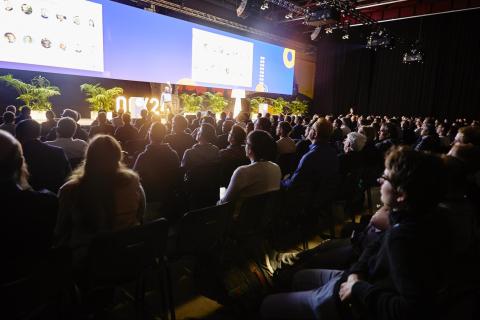
Keynotes
by Natalia Loungou and Diana Kupfer
OCX featured a total of eight keynotes and a panel discussion on the main stage.
Mike Milinkovich, Executive Director of the Eclipse Foundation, delivered an inspiring opening keynote at OCX, highlighting the organisation's mission and celebrating the community's outstanding achievements. In particular, he recognised the 200 committers present at the conference, calling them the “backbone” of the open source ecosystem.
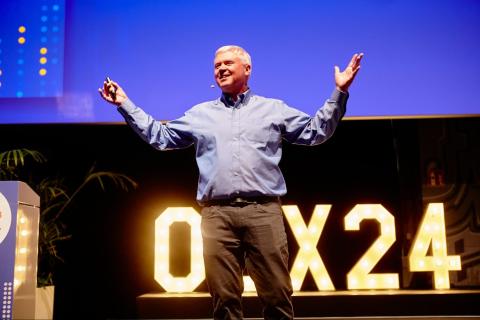
In her keynote “We Build Software in the Open to Build Trust”, Sarah Novotny discussed the need for a fresh approach to supporting open source. Rather than seeing open source as “free like sunshine”, she argued, it should be perceived as “free like a puppy”, requiring adoption and constant care.
Haibo Chen from Huawei and Founding Chair of the OpenHarmony Technical Steering Committee, explored OpenHarmony, an open source operating system designed for the AI era, and Oniro, an interoperable project built on OpenHarmony. He highlighted OpenHarmony's decoupled architecture, distributed capabilities, and support for diverse devices, while showcasing Oniro's focus on interoperability. "Open source is about the people", he concluded, a message that truly resonated with the Oniro community.
In his keynote “BigCode: Building Open LLMs for Code”, Leandro von Werra, Research Lead at Hugging Face, discussed the distinctions between closed model APIs like GPT-4, Gemini, and Claude, and open model weights such as Llama and Mistral, as well as fully open models like Bloom and Olmo. He highlighted the inception of BigCode, which was driven by the idea of creating a fully open model. With contributions from over 1,100 researchers, they tackled the challenge of building a high-quality dataset, including cloning 237 million GitHub repositories to curate 2.9 TB of usable data. Leandro emphasised transparency, sharing details about the dataset and introducing an app, "Am I in The Stack?", allowing individuals to opt out of the dataset.
Wednesday’s keynotes started with extreme sports pioneer Cédric Dumont. Through his experiences, Cédric emphasised the power of collective intelligence and trust within a team. Success, he explained, often comes down to resilience and training your brain to think positively. “When you're stressed, the brain defaults to negativity, but you can train it to focus on solutions.” The key takeaway: “Don’t listen to the ‘what ifs.’ Train your brain to embrace risk, push limits, be consistent, and think positively. Everything you really want is on the other side of fear.”
After Cédric, Ruth Ikegah, Open Source Program Manager, Technical Writer, GitHub Star, and Public Speaker, presented her keynote “From Local Roots to Global Impact: Building an Inclusive Open Source Community in Africa”, emphasising the key pillars of inclusion in OSS projects, including clear documentation, accessible leadership, and effective onboarding for newcomers. She also discussed the unique challenges faced by the OSS community in Africa, such as infrastructure limitations, skill gaps, and logistical hurdles like visas and travel. Ruth shared strategies for overcoming these obstacles, including allyship, community audits and surveys, mentoring programs, and initiatives like diversity sponsorships and grants.
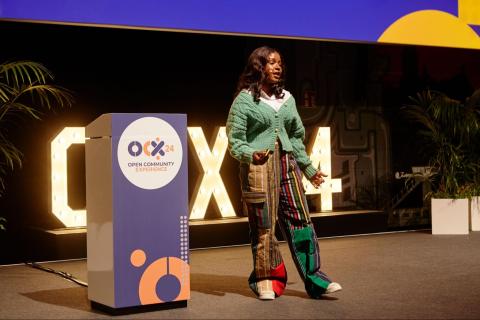
Both keynotes on the last conference day were dedicated to the topic of open source and AI. Stefano Maffulli, Executive Director of the Open Source Initiative (OSI), reported about the challenges of attaining a universally accepted definition of open source AI, and how a global effort, under the auspices of the OSI, to establish such a definition has brought together a diverse group of stakeholders from various disciplines, including technologists, legal experts, policymakers, and representatives from civil society organisations. Just after OCX, the OSI announced a first version of an official open source AI definition.
Yann Lechelle, Co-founder and CEO of Probabl, focused on Europe’s strategic position, competitiveness, and tech sovereignty in the race for market share in an age where “AI is going to eat software.” He recommended that the EU stimulate both the supply and demand for AI to avoid losing the market entirely to the US and China.
The keynote panel "Open Source Facing European Regulation: What's the Plan?", moderated by Enzo Ribagnac (Eclipse Foundation), provided valuable insights into the impact of the Cyber Resilience Act (CRA) on both the digital sector and the open source community. Panelists Cédric Brun (OBEO), Marta Rybczynska (Eclipse Foundation), and Detlef Zerfowski (ETAS) discussed strategies for addressing the challenge of implementing CRA within the next three years. They also highlighted how the Eclipse Foundation is amplifying its members' voices and influencing the CRA to benefit the open source ecosystem.
Main OCX Tracks
by Javier Valiño
The OCX main tracks were a remarkable success this year, especially due to its innovative “silent disco” format. Attendees were equipped with headsets that allowed them to tune into one of three simultaneous talks across our four main tracks. This setup created a dynamic atmosphere where attendees could personalise their experience and effortlessly switch between talks that piqued their interest. The silent disco approach received an overwhelmingly positive response, as it provided a flexible and engaging way to manage the content-rich agenda, allowing our diverse audience to explore the topics that mattered most to them without physical or auditory distractions.
Over the three days, we covered four main tracks: Embedded, IoT, and Edge, Open Source Security, Open Technologies, and Open Source and Open Collaboration Practices. Each track explored cutting-edge developments in their respective areas. The Embedded, IoT, and Edge track led discussions on the lifecycle of data from devices to the cloud and back, emphasising connectivity and device management. Open Source Security highlighted emerging tools, automation, and best practices for OSS security. Meanwhile, Open Technologies explored practical applications of open source in fields like AI, sustainability, and engineering. Lastly, Open Source and Open Collaboration Practices showcased successful collaboration models and governance strategies. The blend of diverse topics and the silent disco format made OCX an immersive, educational, and engaging experience for all involved.

EclipseCon
by Thomas Froment
Overall, EclipseCon 2024 was a resounding success, with well-attended sessions and a highly engaged community. The event provided a valuable opportunity for developers to reconnect, collaborate, and explore both the modernisation of established tools and the integration of new solutions into their daily practices. EclipseCon reaffirmed its status as an essential gathering for advancing the future of open source development tools, encouraging an enthusiastic exchange of ideas on how best to support and expand the Eclipse IDE ecosystem for years to come.
EclipseCon 2024 kicked off with an energetic start, attracting a full house for Heiko Klare’s presentation on Initiative31, an ambitious plan to revamp the Eclipse Platform and IDE, especially its SWT layer. Interest in this topic extended into a crowded "Birds of a Feather" (BoF) session, where more than 65 participants engaged in discussions about these upcoming updates. The high attendance reflected the community’s excitement for modernising the Eclipse platform and its commitment to advancing open source tools and fostering collaboration within the Eclipse IDE ecosystem.

AI’s role in IDEs sparked varied reactions throughout the conference, particularly in sessions focused on Theia IDE. Some participants viewed AI as a revolutionary addition to IDEs, while others saw it as a supplementary tool with some limitations. These perspectives fueled vibrant discussions on AI's benefits and constraints in development, showcasing the community's keen interest in how AI can enhance or complement developer workflows in IDEs.
One of the most attended sessions, "Navigating the Evolution from Desktop to Cloud IDEs," addressed the Eclipse community’s interest in cloud-based development environments. While traditional desktop IDEs still hold strong support, there is growing curiosity about cloud IDEs for their rapid setup and cloud infrastructure advantages. The session generated lively debate, with attendees discussing the benefits and trade-offs of cloud-based solutions, reflecting an industry trend towards hybrid and flexible development tools.
EclipseCon also highlighted updates and new features across several widely used tools, including Spring, Eclipse Che, Eclipse Sirius, and Eclipse SysOn, especially within the modeling domain. In addition, the unveiling of new tools and projects like Typir – a fresh open source framework for type-checking in the web environment – and the Eclipse Open Collaboration Tools (OCT) project captured the audience's attention.
One notable trend that emerged is the importance of "component models” in developer tools, aiming to create “IDE-agnostic” extensions that work seamlessly across popular IDEs in the market. This movement towards adaptable, flexible components underscores a broader industry shift toward compatibility and interoperability, empowering developers with more choices and tailored workflows.
Open Community for Java
by Tanja Obradovic
Open Community for Java 2024 is a very different and new approach to a conference for Java related projects at the Eclipse Foundation. It was a part of the larger OCX conference, at a new location with a fresh, out-of-the-box approach uniquely tailored to a new generation of developers – just what Java needs! Besides talks related to enterprise Java topics (Jakarta EE and MicroProfile) and Adoptium, we introduced a Coding Lounge as well as an Unconference. The Coding Lounge was geared towards new contributors and anyone wishing to be involved in open source projects, while the Unconference is a space for a wide variety of topics to be suggested, selected for discussion by the attendees. The Coding Lounge leads were Simone Bordet, Hendrik Ebbers, Ivar Grimstad and Reza Rahman, while Sandra Parsick and Ixchel Ruiz were leading the Unconference.
The conference was summed up perfectly by Adam Bien’s feedback. Next time our focus needs to be making sure that our immediate community of contributors and committers as well as Java technology and application developers are well informed about the conference and can plan for attending it well in advance!
Open Community for Automotive
by Sara Gallian
Open Community for Automotive (OCA) is also a co-located event within the Open Community Experience framework. OCA showcased the breadth of the automotive initiatives the foundation is involved in: from the EU Coordination and Support Action FEDERATE, to the Eclipse SDV Workings Group.
The heterogeneous program with a technical focus attracted a strongly involved audience and all presenters received several follow-up questions. It was very refreshing to see such great interest.
While the program as a whole was very strong, here are a few highlights:
- Rolf Riemenschneider from the European Commission who introduced the EU vision for Software Defined Vehicle of the Future.
- Dirk Slama explaining how to use Gen AI and Eclipse Autowrx for rapid prototyping of SDV applications.
- Two presentations on the Eclipse uProtocol project by Steven Hatley, Daniel Krippner and Kai Hudalla.
We’re proud of the automotive community’s participation at large and we are looking forward to our SDV Hackathon Chapter 2 in November.
eSAAM
by Philippe Krief
For its fourth edition, eSAAM 2024 welcomed 25 industry experts and researchers from the dataspaces domain to the Eclipse community event. The day was structured into four sections – Strategy, Architecture, Applications and Use Cases, and Security – featuring 14 accepted papers.
Each session was opened or concluded by a keynote speaker, including Rolf Riemenschneider from the European Commission, Prof. Boris Otto from Fraunhofer ISST, Prof. Ricard Martinez from the University of Valencia, and Javier Valiño from the Eclipse Foundation. The event aimed to strengthen ties between European researchers and our annual Eclipse community gathering. Feedback was overwhelmingly positive, with attendees expressing enthusiasm not only for the eSAAM organisation but also for the broader OCX event. Many participants were already curious about the main topics planned for the next event.
So, to conclude, we announced that the next event will span three days instead of one: one day dedicated to research papers (eSAAM 2026), a day for talks and panels on “Open Source in Research”, and a final day for research project “Hackathons”. This expanded event will be called OCR – Open Community on Research.
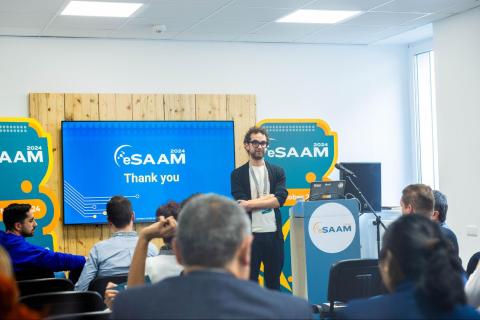
OSGi Summit
Traditionally an integral part of EclipseCon, OSGi Summit was also among the collocated events at OCX. This one-day gathering brought together experts and practitioners to explore the latest advancements in OSGi technology, ranging from OSGi.fx and the COGNIFOG project to OSGi in vehicles, Smart Cities, the Feature Launcher, testing, and Bndtools. OSGi Summit offered a deep dive into modular software development, interoperability, and system integration, featuring talks, case studies, and workshops, all of which aimed to equip attendees with actionable insights into leveraging OSGi in various contexts.
Diversity & Inclusion, Games, Awards, and the Next OCX
OCX 2024 also offered a number of fun activities and an entertainment program, including a magic show on Wednesday (s. photo), a “Painting by Numbers” wall, a “Tell Us” wall, an app game and a quiz where participants were able to win prizes such as tech gadgets, specialities from different countries, and conference swag.
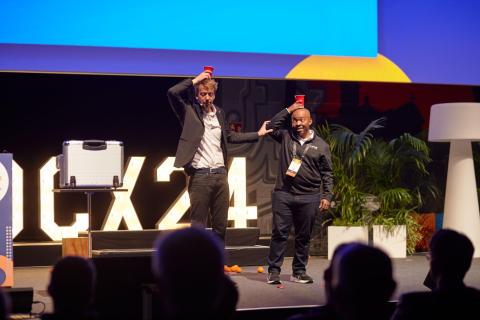
On Thursday, Carmen Delgado and Anne Jacko (Eclipse Foundation) moderated a lunch discussion on diversity and inclusion, inviting community members to help create the basis for a more diverse approach for open source contributors and the project development process.
On Wednesday, Jonas Helming (CEO of EclipseSource) received the prestigious “Lifetime Achievement Award” from the Eclipse Foundation, recognising his long-term dedication to the Eclipse open source community as a committer, project lead (of Eclipse Theia, among other projects), and evangelist (s. photo).
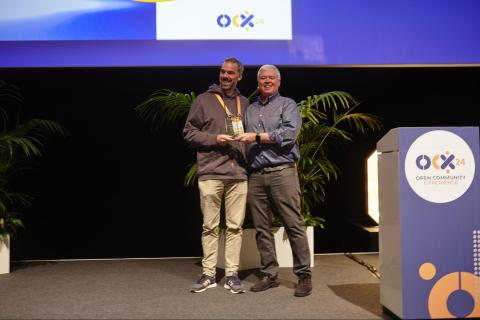
Also on Wednesday, the city and venue of the next edition of OCX were unveiled in a spectacular preview video and on-stage show: the next instalment of the Eclipse Foundation’s new flagship conference is set to take place in Brussels, Belgium, at the iconic event venue “The Egg”, in spring 2026. With a year and a half to go until OCX 2026, the open source community will have to be a little more patient this time, but the wait will definitely be worth it: As a hub of innovation hub and place where new ideas can hatch and take flight, the venue and the season of spring will offer the ideal backdrop for the next generation of Eclipse Foundation conferences.
Here is a video recap of this year’s event:
Check out our Flickr album for more impressions from the conference.
Further reading:
- Obeo, strategic Eclipse Foundation member since 2008 and longtime sponsor of EclipseCon and now OCX, summarised their experiences in a blog post.
- Ivar Grimstad blogged about Open Community for Java. Check out his post.
- Dev-Insider, a German IT news portal, published a comprehensive conference report (in German)
- Nikola Babadzhanov from Bosch also wrote a nice event recap titled "OCX 24 - A melting pot of ideas and inspiration"
